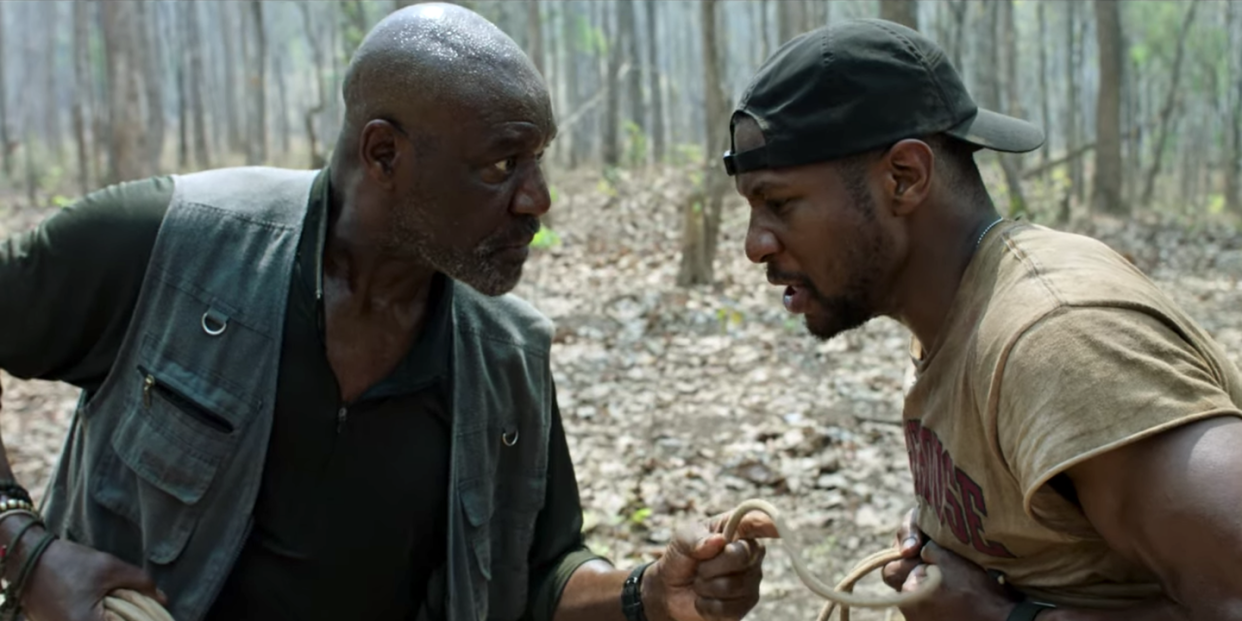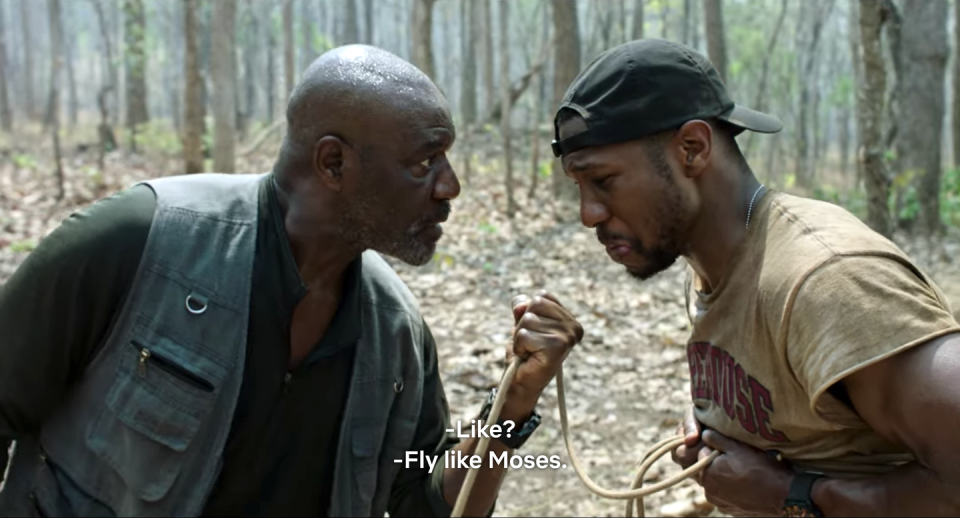How ‘Da 5 Bloods’ Pulled Off That Intense Land Mine Scene

Spoiler alert: the following story discusses, in-depth, a very specific moment from Spike Lee's Da 5 Bloods.
There might not be a more intense five minutes in film this year than a sequence in Spike Lee's new film Da 5 Bloods involving actors Jonathan Majors, Delroy Lindo, and a land mine, set in the midst of the sweltering Vietnam jungle.
The scene takes place only mere moments after one of the titular 5 Bloods, Eddie (Norm Lewis) unwittingly got himself blown up by stepping onto a land mine, and David (Majors) realizes that he, too, has stepped on one. He alerts his father, another of the Bloods, Paul (Lindo), and everyone else in their traveling party. At that exact moment, a team of mine-removal experts that David met earlier at a bar shows up.
"Oh yeah, Jesus!" Majors says just hearing the scene mentioned. "Man, it was literally life and death."
As part of his process, Majors says he always wants whatever he's doing on screen to be and feel as real as possible. The script hints that his character was a sprinter at Morehouse College, a Historically Black Men's College in Atlanta—so he sprinted his way to set every day. So when it came time to film the land mine scene, he saw where the land mine was going to be, marked it in his mind, and as soon as he stepped on it for the first time, he didn't move. The camera moved—the shot had to readjust—but Majors remained just as still in real life as David was in the film.
"I hate the idea of acting something. Your imagination knows, and your imagination will believe it, and your body knows the difference," he says. "I just let the landmine, and the given circumstances of the moment, fill that in."
The circumstances of the moment that he describes speak for themselves in the film, but we'll break it down explicitly. David, from New Orleans, has flown all the way to the other side of the world in an attempt to cram himself into an adventure, seeking more time with his distant father. He figured his dad, Paul, might be on his metaphorical (and possibly literal) last legs. Now, with his body weight entirely atop an old land mine, he realizes he's made a huge mistake—he could be the one on his last legs.
"I've made a huge mistake in front of my hero, and I put us all in jeopardy," Majors says. "So, being on a landmine was more about everybody else, and just the amount of disappointment that was running through me. You know: 'I'm letting my Dad down, in this moment.'"
And when the cameras stopped rolling, and everyone went to get some water, or a snack, or just relax for a couple minutes between takes, Majors stayed still. David couldn't budge off that land mine, so neither could he.
"I just kept looking at Delroy, and kept looking at Clarke Peters, who's my godfather in the scene, and thinking 'I don't want to leave.' 'I don't want to die.' Most importantly, I don't want to let you all down."
As the scene continues, Paul hatches a plan to get David off the mine. Key idea? Run like the wind. David wears a 'Morehouse' shirt in the scene, and Paul hypes him up by bringing up Edwin Moses, a Morehouse alum who just happens to be the greatest hurdler in history (and a two-time Olympic gold medalist).
"David, that man could fly," Paul tells him, preparing for the speed he'll need to incorporate to get off the mine in time to not be blown to bits. "What you gonna do?"
"Fly," David answers, before his father clarifies who he's going to fly like. "Fly like Moses," he says, as Paul nods his head and begins to back up.

This entire Edwin Moses tangent, it turns out, was ad-libbed on set while shooting—Lee came up with it while Majors, whom he called "Morehouse" for the duration of filming, was already standing still on the land mine. "Morehouse! Morehouse! Don't move! Don't move! Don't move!," Lee said, running up to Majors to tell him the idea that he'd devised in the moment.
For Lee, a third-generation Morehouse graduate himself, it was an addition that just came to him. In his mind, it was a close-to-home and semi-casual way to work a deeper reference into what might just be the movie's most tenuous moment.
"My father was a freshman at Morehouse when Dr. Martin Luther King was a senior, and Martin Luther King III and I are classmates, Class of '79," Lee says. "The class before me was Edwin Moses, the greatest hurdler ever. So, we just worked Morehouse and Edwin Moses into it."
Majors also offered a glimpse into Lee's directorial style with an apt comparison that should be immediately applicable for any basketball fan.
"Spike directs like Phil Jackson, you know what I'm saying? So sometimes he's very quiet. And then sometimes, he can go Bobby Knight, where he's screaming at you," he says, beginning to sound a little worked up just thinking about the making of the scene. "And he's screaming at me, and I'm on the landmine, and he comes up to the landmine, and I'm like, You can't scream at me man! I'm on this landmine! What are you doing? I can't hear you good. And he comes out, and he goes 'OK, OK, Morehouse, OK, It's all good, baby.'
As Majors continues, it's clear from his voice that he's diving into an experience that was nothing less than intense.
"My mind's racing, and I'm trying to metabolize what he's saying to me, and at the same time keep Spike happy, because he's the god, right? Do the job, but then also play off of Delroy [Lindo] and Clarke [Peters], and this fucking landmine," he says, before finally addressing the film's viewers directly. "I'm glad you were on the edge of your seat, because I was on the edge of my brain."
You Might Also Like
